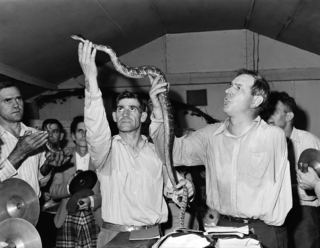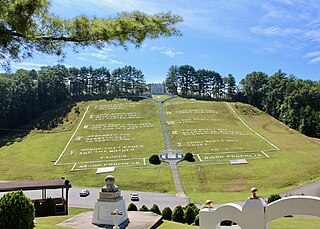Related Research Articles
Pentecostalism or classical Pentecostalism is a Protestant Charismatic Christian movement that emphasizes direct personal experience of God through baptism with the Holy Spirit. The term Pentecostal is derived from Pentecost, an event that commemorates the descent of the Holy Spirit upon the Apostles and other followers of Jesus Christ while they were in Jerusalem celebrating the Feast of Weeks, as described in the Acts of the Apostles.

Snake handling, also called serpent handling, is a religious rite observed in a small number of isolated churches, mostly in the United States, usually characterized as rural and part of the Holiness movement. The practice began in the early 20th century in Appalachia and plays only a small part in the church service. Participants are Holiness, or Pentecostals. The beliefs and practices of the movement have been documented in several films and have been the impetus for a number of state laws related to the handling of venomous animals.

The Church of God, with headquarters in Cleveland, Tennessee, United States, is an international Holiness-Pentecostal Christian denomination. The Church of God's publishing house is Pathway Press.
The Holiness movement is a Christian movement that emerged chiefly within 19th-century Methodism, and to a lesser extent influenced other traditions such as Quakerism, Anabaptism, and Restorationism. The movement is historically distinguished by its emphasis on the doctrine of a second work of grace, generally called entire sanctification or Christian perfection and by the belief that the Christian life should be free of sin. For the Holiness movement, "the term 'perfection' signifies completeness of Christian character; its freedom from all sin, and possession of all the graces of the Spirit, complete in kind." A number of evangelical Christian denominations, parachurch organizations, and movements emphasize those beliefs as central doctrine.
The Azusa Street Revival was a historic series of revival meetings that took place in Los Angeles, California. It was led by William J. Seymour, an African-American preacher. The revival began on April 9, 1906, and continued until roughly 1915.
The Holiness Baptist Association is a holiness body of Christians with Baptist historical roots.
The Church of God or TCOG is a Holiness Pentecostal denomination of Christianity. It is based in the United States. The church's actual name is The Church of God; however, the parenthetical phrase Charleston, Tennessee is added to distinguish it from similar-sounding organizations. The Church of God was organized in 1993 after a schism in the Church of God of Prophecy. Its headquarters is in Cleveland, Tennessee but its postal address is in Charleston, Tennessee. As of 2007, The Church of God operates in 48 countries and territories.

The Church of God of Prophecy (COGOP) is a Holiness Pentecostal Christian church. It is one of six Church of God bodies headquartered in Cleveland, Tennessee, that arose from a small meeting of believers who gathered at the Holiness Church at Camp Creek near the Tennessee/North Carolina border on Saturday, June 13, 1903.
The (Original) Church of God is a Holiness Pentecostal Christian denomination located mostly in the Southeastern United States. Its origins can be traced to a small meeting of Christians at the Barney Creek Meeting House in Monroe County, Tennessee in 1886. This church is often denominated the Church of God to distinguish it from other related Church of God bodies, but the church's designation for itself is The (Original) Church of God, Inc. Offices and a publishing house are located in Chattanooga, Tennessee and Pulaski, Tennessee.

The International Pentecostal Holiness Church (IPHC) or simply Pentecostal Holiness Church (PHC) is an international Holiness-Pentecostal Christian denomination founded in 1911 with the merger of two older denominations. Historically centered in the Southeastern United States, particularly the Carolinas and Georgia, the Pentecostal Holiness Church now has an international presence. In 2000, the church reported a worldwide membership of over one million—over three million including affiliates.
Gaston Barnabas Cashwell was an early Pentecostal leader in the southern United States. He was born in Sampson County, North Carolina.His importance lies in bringing several Holiness movements into the Pentecostal camp.

William Joseph Seymour was an African-American holiness preacher who initiated the Azusa Street Revival, an influential event in the rise of the Pentecostal and Charismatic movements. He was the second of eight children born to emancipated slaves and raised Catholic in extreme poverty in Louisiana.

Charles F. Parham was an American preacher and evangelist. Together with William J. Seymour, Parham was one of the two central figures in the development and early spread of American Pentecostalism. It was Parham who associated glossolalia with the baptism in the Holy Spirit, a theological connection crucial to the emergence of Pentecostalism as a distinct movement. Parham was the first preacher to articulate Pentecostalism's distinctive doctrine of evidential tongues, and to expand the movement.
The Shearer Schoolhouse Revival was a series of Christian evangelical meetings conducted in mid-1896 in Cherokee County, North Carolina, United States.
Bishop Charles Harrison Mason Sr. was an American Holiness–Pentecostal pastor and minister. He was the founder and first Senior Bishop of the Church of God in Christ, based in Memphis, Tennessee. It developed into what is today the largest Holiness Pentecostal church denomination and one of the largest predominantly African-American Christian denominations in the United States.
The Church of God, Alexander Jackson Sr. General Overseer, formerly The Church of God under the leadership of Bishop James C. Nabors, is a Pentecostal Christian denomination with roots in the late 19th-century American Holiness movement and early 20th-century Pentecostal revival. It shares a common history with The Church of God (TCOG) until 2006 when a separation occurred. The official name is The Church of God. The phrase Alexander Jackson Sr. General Overseer is added to distinguish this group from many others called Church of God.

Ambrose Jessup (A.J.) Tomlinson, a former Quaker, united with the Holiness Church at Camp Creek in 1903. With his drive, vision, and organizational skills, he was elected the first general overseer of the Church of God in 1903. He also served as the first president of the church's Lee College, later known as Lee University (1918–1922). In 1923, Tomlinson was impeached, causing a division which led to the creation, by followers of Tomlinson, of what would become the Church of God of Prophecy.
The Finished Work is a doctrine associated with Pentecostals of the Finished Work Pentecostal tradition, that locates sanctification at the time of conversion; afterward the converted Christian progressively grows in grace. This is contrary to the Wesleyan doctrine of entire sanctification that locates complete sanctification in a definite second work of grace which Holiness Pentecostals teach is a necessary prerequisite to receive the baptism in the Holy Spirit. Finished Work Pentecostals are generally known to have retained the doctrine of progressive sanctification from their earlier Reformed roots, while Holiness Pentecostals retained their doctrine of entire sanctification from their earlier Wesleyan roots. The term finished work arises from the aphorism "It's a Finished Work at Calvary", referring to both salvation and sanctification. Though the term is used within Pentecostal Christianity, it is not exclusively a Pentecostal doctrine.
The Latter Rain Movement was a late nineteenth-century radical Holiness theology and Revivalist phenomenon which began in western North Carolina and eastern Tennessee. Elements of the movement gave rise to and merged with what would become incipient modern Pentecostalism.

Fields of the Wood is a Christian religious park of more than 200 acres (81 ha) in Cherokee County, North Carolina, owned by the Church of God of Prophecy—a Holiness Pentecostal denomination. It is best known for its 300-foot (91 m) wide, mountainside representation of the Ten Commandments.
References
- ↑ Pentecostal Theology website
- ↑ "The Church of God observes centennial; Camp Meeting begins" . The Greenville News. Greenville, South Carolina. June 28, 1986. p. 22. Retrieved October 12, 2018– via Newspapers.com.
- 1 2 "Church of God Celebrates 125 Years". Charisma News . 2011-10-08. Retrieved 2016-07-17.
- ↑ Beautiful Feet website
- ↑ Clark (1949), p. 101.
- ↑ Faith News Network website
- ↑ Think Revival website
- ↑ Shulman (1981), pp. 273-274.
- ↑ Evangel Magazine website
- ↑ R.G. Robins (2004). A.J. Tomlinson: Plainfolk Modernist. Oxford University Press. pp. 15, 117, 127, 168.
- ↑ Robins (2004), p. 183.
- ↑ Find a Grave website
- ↑ Faith News Network website